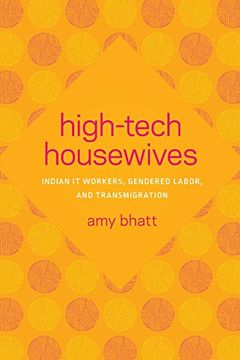Compartir
High-Tech Housewives: Indian it Workers, Gendered Labor, and Transmigration (Global South Asia) (en Inglés)
Amy Bhatt (Autor)
·
University Of Washington Press
· Tapa Blanda
High-Tech Housewives: Indian it Workers, Gendered Labor, and Transmigration (Global South Asia) (en Inglés) - Amy Bhatt
$ 60.670
$ 93.340
Ahorras: $ 32.670
Elige la lista en la que quieres agregar tu producto o crea una nueva lista
✓ Producto agregado correctamente a la lista de deseos.
Ir a Mis Listas
Origen: España
(Costos de importación incluídos en el precio)
Se enviará desde nuestra bodega entre el
Miércoles 10 de Julio y el
Miércoles 17 de Julio.
Lo recibirás en cualquier lugar de Chile entre 1 y 3 días hábiles luego del envío.
Reseña del libro "High-Tech Housewives: Indian it Workers, Gendered Labor, and Transmigration (Global South Asia) (en Inglés)"
Tech companies such as Google, Amazon, and Microsoft promote the free flow of data worldwide, while relying on foreign temporary IT workers to build, deliver, and support their products. However, even as IT companies use technology and commerce to transcend national barriers, their transnational employees face significant migration and visa constraints. In this revealing ethnography, Amy Bhatt shines a spotlight on Indian IT migrants and their struggles to navigate career paths, citizenship, and belonging as they move between South Asia and the United States. Through in-depth interviews, Bhatt explores the complex factors that shape IT transmigration and settlement, looking at Indian cultural norms, kinship obligations, friendship networks, gendered and racialized discrimination in the workplace, and inflexible and unstable visa regimes that create worker vulnerability. In particular, Bhatt highlights women's experiences as workers and dependent spouses who move as part of temporary worker programs. Many of the women interviewed were professional peers to their husbands in India but found themselves "housewives" stateside, unable to secure employment because of visa restrictions. Through her focus on the unpaid and feminized placemaking and caregiving labor these women provide, Bhatt shows how women's labor within the household is vital to the functioning of the flexible and transnational system of IT itself.

